- Home
- Simon Beckett
Written in Bone dh-2 Page 8
Written in Bone dh-2 Read online
Page 8
So why did I still feel I was missing something?
A wayward gust of wind from the holes in the roof chilled me as I stood looking down at the remains. I went to where the skull lay canted on the floor, crazed with heat fractures. The cranium is made up of separate plates that butt against each other like geological fault lines. The blow-out had left a hole nearly the size of a fist in one of them, on the occipital bone at the back of the crown. Small fragments of bone lay on the floor around it, blown there when the hot gases had made their explosive exit. That was another indication that the damage happened in the fire-if the hole had been caused by an impact the fragments would have been driven inwards, into the skull cavity.
Yet something about the skull bothered me, a sort of nagging neural itch. Almost involuntarily, I found myself starting to examine it again.
As though with malicious timing, the daylight had begun to fade with increasing speed. Last night I’d avoided working at night because I didn’t want to make mistakes. Now I felt I would be making an even bigger one if I didn’t. I moved the floodlight, but it still wasn’t bright enough for what I wanted. Taking out my torch, I set it on the floor so it shone on to the gaping skull cavity.
Light spilled eerily from the empty eye sockets as I turned my attention to the shards of bone that lay on the floor. Most were tiny, no bigger than my thumbnail. I’d already recorded their positions on the graph paper but now, like a ghoulish jigsaw puzzle, I began trying to piece them back together.
It was something I’d normally only attempt in a laboratory, where I had the right clamps, tweezers and magnifying lenses to help me. Here I didn’t even have a table, and my progress was made even slower by my cold-numbed fingers. Gradually, though, I fitted the fragments together until I had a sizeable section.
And then I saw it.
A blow forceful enough to break the cranium will cause lightning-like fractures to radiate from the point of contact. Normally they’re hard to miss, and I’d seen no evidence of them here. But I’d been looking in the wrong place. The fragments had joined together to reveal a ragged spider’s web of cracks. Distinctive, zigzag lines that could only have been caused by a heavy impact, strong enough to fracture the bone without actually breaking it.
The skull had burst in the fire, all right, but in an area where it had been already weakened.
I carefully laid the bone fragments back on the ground. Brody had been right all along. This was no accident.
The woman had been murdered.
CHAPTER 8
I BARELY NOTICED the wind and rain as I went back to the camper van. It was pitch dark outside, and the light from its window shone out like a beacon. There was a sour taste in my mouth. Someone had killed a young woman and then set fire to her body. Whether Wallace liked it or not, he hadn’t any choice now but to escalate this to a full-scale murder inquiry.
I was angry with the superintendent, but far more so with myself. It was no consolation that fire deaths are notoriously difficult; I should have taken notice of my instincts. And there was also something else to consider. It would be a mistake to assume that, just because the dead woman wasn’t local, her killer wasn’t either. We didn’t know what the victim had been doing on Runa, but according to Brody few outsiders came here at this time of year. So the likelihood was that she’d come over either with, or to see, someone who lived here.
Which would mean her killer was still on the island.
That thought stayed with me as I hurried to the camper van. It was almost stiflingly warm after the icy cottage, the air heavy with the fumes from the paraffin heater.
‘How’s it going?’ Duncan asked, getting to his feet.
‘I need to talk to Wallace. Can I use your radio?’
‘Uh, sure,’ he said, surprised. He handed it across. ‘I’ll er, I’ll be outside, then.’
The police radio was one of the new digital sets, which allowed calls to either landlines or mobiles. But Wallace didn’t answer any of his numbers. Great. I left messages telling him to call me and started struggling out of my overalls.
‘Everything all right?’ Duncan asked, coming back in.
‘Fine.’ He would find out soon enough, but I wanted to speak to Wallace before I told anyone else. ‘I’m going back to the village.’
There was no point my staying at the cottage any longer. I wasn’t touching anything else till SOC got here, and I needed to calm down and think through the implications of what I’d found. But as I started to go out I hesitated.
‘Look, keep an eye out, OK? Anything suspicious, anyone comes out here, call Fraser straight away.’
He looked puzzled and a little offended. ‘Aye, of course.’
I went out to the car. It was raining heavily now, and the windows on Ellen’s old VW fogged as soon as I got in. Turning the heater on to clear them, I struggled with the unwieldy gear lever and bumped down the track to the road. The wipers screeched as they smeared rain across the windscreen. I sat forward in my seat, peering through the steamed glass. Hardly any cars seemed to use the road, but I’d no desire to hit a sheep that had strayed on to the tarmac.
I was about halfway to the village when a pale shape suddenly darted into the road in front of me. There was just time to see the reflective eyes of a dog gleam in the headlights as I stamped on the brake, and then the car spun out of control. The VW slewed crazily, flinging me against the seatbelt as it lurched to a halt.
The impact took my breath away. I sat back, shaken, rubbing my chest where the seatbelt had bruised it. But I wasn’t badly hurt, and the VW’s engine was still running. The car had gone off the road and was angled down into a ditch, its headlights shining on to thick hummocks of grass rather than tarmac.
At least I hadn’t hit the dog. I’d seen it bounding off as I lost control. It had been a golden retriever, so unless there were two on the island it must have been Strachan’s, although God knew what it was doing out here.
The thought that it had all of the island to choose from, yet had managed to run out in front of me, didn’t help my temper as I put the gears into reverse and tried to back up on to the road. The wheels churned and skidded, but the car didn’t move. I shifted into first and tried to go forward, with the same result.
I switched off the engine and got out to take a look. The car didn’t appear to be damaged, but the rear wheels were bogged down in muddy ruts. Putting up my hood, I went to the boot to try to find something to give the tyres purchase. But there was nothing. I got back in the car, the rain glistening like white wires in the headlights as I considered my options. There was no point going back to the camper van, so that left two choices. I could either stay with the car until someone came along, or walk the rest of the way to the village. If I stayed I could be waiting hours. And at least walking would keep me warm.
I swore as I realized that I’d left my torch in my flight case back at the van. I turned on the overhead light and checked the glove compartment, hoping to find one there. But apart from some old maps and scraps of paper it was empty.
I turned off the headlights and waited for my eyes to adjust to the sudden dark. After a while I accepted they were as acclimatised as they were going to get. Night had fallen on Runa, and it was only going to get darker. Still, I felt reluctant to leave the car. I’d just found out there was probably a killer on the island. It was an unsettling thought to find yourself stranded with on an isolated road.
But that was stupid. Even if he was still on Runa, the young woman’s killer would hardly be out here. Come on. No point waiting any longer.
I got out of the car. As I did, the moon appeared through a break in the clouds. It gave the moors and hills a stark but ethereal beauty, picking out the road with a silvery illumination. My spirits rose as I started walking. Not so bad after all. And just as I thought that, clouds shrouded the moon again, and the light was abruptly cut off.
The utter blackness shocked me. I’d lived in the country, and thought I knew how dark a night could
be. But this was of a different order to anything I’d experienced before. Runa was a tiny island, miles from the mainland and with no towns or cities to cast even a distant glow. I looked up, hoping to see at least some evidence of lightening in the sky. There was nothing. The cloud bank extinguished any glimpse of stars or moon as effectively as a blanket.
I looked back, hoping to see some reassuring sign of the VW. But the darkness was absolute. Only the sound of my footsteps told me I was still on the road. It’s only the dark. It won’t hurt you. Provided I didn’t stray from the road, there was nothing to worry about. Sooner or later it would lead me back to the village.
Even so, as I started walking again my confidence ebbed with every step. The rain was freezing and the wind whittled away at my body heat, making me virtually deaf as well as blind.
But not so deaf that I didn’t hear a scuff on the road behind me.
I spun round, heart thumping. I couldn’t see a thing except blackness. Probably just a sheep, or something blown by the wind. Or Strachan’s bloody dog. Turning my back on it, I started walking again. But all my senses were attuned to what might be out there with me, and I was still straining to hear it when I suddenly stepped out into nothing.
I pitched forward, arms windmilling before the ground smacked into me. I tumbled downhill, all sense of up or down lost. Rough grass scratched at my face, and then I jolted to a stop.
Dazed and winded, I lay in the muddy grass, rain bouncing on my upturned face. I knew what had happened. I’d wandered from the centre of the road without realizing it and walked off the edge into a gully. Idiot! I started to push myself upright, and cried out as pain exploded in my left shoulder. When it had subsided to a dull ache, I gingerly moved my arm again. The pain lanced back, not quite as severe as before but bad enough to make me gasp out loud.
But at least there had been no sensation of grating bone. I hoped that meant nothing was broken. Swallowing back the bile that had risen in my throat, I felt my shoulder awkwardly with my other hand. Even through my coat I could tell that there was something wrong with the way the joint fitted together. There was a bulge where there shouldn’t have been, and as my fingers traced its outline I felt a queasy wave of nausea.
I’d dislocated my shoulder. Badly.
I told myself not to panic. Deep breaths. Take it one step at a time. Before I could use my arm again I knew the joint would have to be shot back into place. I reached round with my other hand as far as I could, probing with my fingers to feel where the ball of the humerus had popped out of its socket. I paused, gritting my teeth, and then pushed.
The pain made me almost black out. I yelled as starbursts wheeled across my vision. When they faded I was lying on my back once more, sweat and rain mingling on my face. I wanted to throw up. The spasm subsided but left me weak and shaking.
I didn’t bother feeling the shoulder again. I knew it was still out of joint. It was throbbing relentlessly, a bone-deep ache that radiated from the base of my skull right down my arm. I sat up again, weakly. My head spun as I slowly got to my feet. There was no question of walking to the village now. I would have to try to find the car and sit it out, hoping that Fraser or Duncan would come looking for me sooner rather than later.
Climbing back up the slippery bank was hard work. I couldn’t see a thing, and could only use one hand to help drag myself up the slope. I had to keep resting, and my shoulder was hurting more than ever now. I wondered if I’d torn any ligaments, but put the thought out of my mind. I couldn’t do anything about it if I had.
By the time the slope began to level out I was sweating and exhausted. I hauled myself up the last few feet and then straightened on legs that felt like water. Relief at having made it back to the top swamped out anything else. But then I realized something was wrong.
The road wasn’t there.
My relief vanished. I took a few more cautious steps, each time hoping to feel tarmac under my boots. But there was only turf and boggy, uneven ground. I’d obviously been more disorientated by my fall than I’d thought. Instead of climbing back up to the road, I’d clawed my way up another hummock of grass.
I forced myself to stay calm. There was only one thing to do. The road had to be opposite me. All I had to do was retrace my steps and then go up the other side.
I made my way down the muddy slope, slithering the last few feet on my backside. I groped around, trying to locate the slope I’d fallen down. I couldn’t find it. Come on, it has to be here. But the terrain at the bottom didn’t conform to such neat logic. In the dark it was a maze of humps and gullies. Wandering blind as I was, there was no way of knowing where any of them led.
I knew I couldn’t be far from the road, but I had no way of telling which way it was. I looked up, hoping for some glimpse of stars. But land and sky merged into one single, impenetrable darkness. The wind and rain gusted first one way then another, as though trying to confuse me further.
I’d started shivering, from shock as well as cold. Even in my weatherproof outer clothes I knew I could sink into hypothermia if I didn’t find shelter. Come on, think! Which way? I made my decision and started walking. Even if it was the wrong direction, the exertion would help keep me warm. Staying still now would kill me.
It was hard going. The ground was a treacherous mix of heather and grass, threatening to turn or break an ankle at every step. I stopped dead as something rustled nearby, straining to hear against the gusting of the wind and the rain on my hood. I couldn’t see anything except darkness. My heart was racing. It’s nothing. Just a sheep.
But even as I tried to convince myself, I was recalling the scuff I’d heard behind me on the road. I knew I was being irrational, that even if there was someone else out here, they wouldn’t be able to see me any more than I could see them. It didn’t help. I was lost and injured, and the dark released all the primitive fears that daylight and the modern world have allowed us to bury.
They weren’t buried now.
I carried on walking. The turf underfoot became wetter and more broken as I blundered into a peat bog. My teeth were chattering as I splashed noisily across. Either it had grown colder or my core temperature was dropping despite my efforts. Both, probably.
My shoulder was on fire, lancing me with white heat at every step. I’d lost track of time but I was tiring quickly, becoming careless with fatigue. Another noise came from off to one side, the sound of something moving through the grass. I spun towards it and went crashing down. Agony flared through my injured shoulder as it bore the full brunt of my weight.
I must have passed out. When I came round I was lying face down, the rain pattering hypnotically on my hood. I could taste the loamy stink of peat in my mouth. Still only semi-conscious, I found myself thinking about all the countless dead animals, insects and vegetation it was made from: millennia of rot compressed into a petrochemical sludge. I spat it out and tried to push myself up, but the effort was too much. Water had seeped inside my coat, chilling me to the bone. I was shuddering from the cold, my strength gone. I collapsed back into the mud. Of all the bloody stupid ways to die. It was so absurd it was almost funny. I’m sorry, Jenny. She’d been mad enough just because I came out here. She was going to be furious when she found out I’d let it kill me.
But the attempt at gallows humour failed miserably. Lying there, I felt anger as well as sadness. So that’s it, is it? I goaded myself. You’re just going to give up?
It was then, when it could have gone either way, that I saw the light.
At first I thought I was imagining it. It was only a spark of yellow, dancing in the blackness ahead of me. But when I moved my head the light remained in the same place. I shut my eyes, opened them. The light was still there. I felt a surge of hope as I remembered Strachan’s house. That was closer than the village. Perhaps I’d wandered in the right direction after all.
Part of me knew even then that the light was too high to be coming from the house, but I didn’t care. It was something to aim for. Without
even thinking about it, I crawled to my feet and began to stagger towards it.
The light hung above me, but how far away I couldn’t tell. It didn’t matter. The yellow glow was the only thing in the universe, drawing me towards it like a moth. It steadily grew larger. Now I could see that it wasn’t constant, but flickered to some unheard rhythm. I was barely aware of the ground starting to rise towards it. It climbed still more, became steeper. I was using my one good arm to help pull me uphill, sometimes sinking to a crawl on my knees before stumbling upright again. But the light was closer. I fixed on it, shutting out everything else.
Then it was right in front of me. Not a car, not a house. Just a small, untended fire in front of a ruined stone hut. As disappointment started to filter through my daze, I began to take in what the firelight revealed. All around me were untidy mounds of rocks, and the sight of them stirred some dim connection. They weren’t natural formations, I realized.
They were burial cairns.
I could remember both Brody and Strachan mentioning them. And, remembering that, I knew I was even more lost than I’d thought.
I’d wandered all the way out to the mountain.
I swayed on my feet, the last of my reserves gone. As my vision swam, I became aware of movement in the mouth of the ruined hut. I stared, too numb and exhausted to move, as a hooded figure slowly emerged from inside. It stepped into the firelight, eyes reflecting the flames as they stared at me from beneath its hood.
Then the fire seemed to grow dark, and the night spun me off into darkness.
CHAPTER 9
THERE WAS NO wind. That was the first thought that came to me. No wind, no drumming of rain.
Just silence.
I opened my eyes. I was in a bed. Muted daylight filtered through pale curtains, revealing a large, white room. White walls, white ceiling, white sheets. My first thought was that it was a hospital, but then I realized most hospitals didn’t run to duvets and double beds. Or en suite glass shower rooms, come to that. And the raffia bedside table looked as if it had come straight from the pages of an interiors magazine.

 Where There's Smoke
Where There's Smoke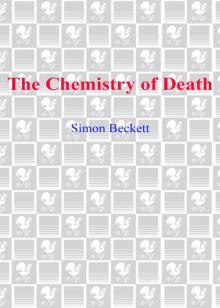 The Chemistry of Death
The Chemistry of Death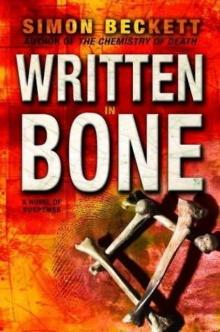 Written in Bone
Written in Bone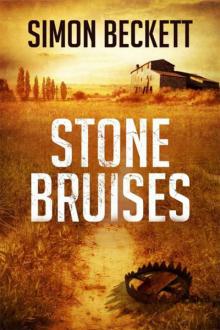 Stone Bruises
Stone Bruises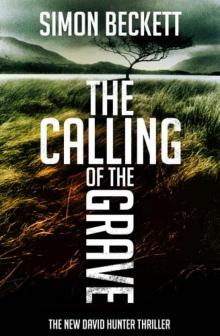 The Calling of the Grave
The Calling of the Grave Whispers of the Dead
Whispers of the Dead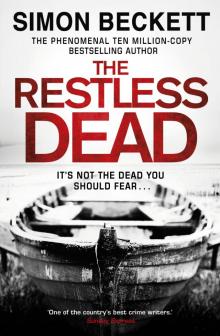 The Restless Dead
The Restless Dead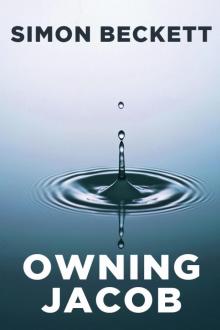 Owning Jacob
Owning Jacob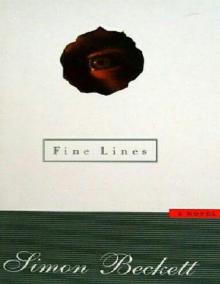 Fine Lines
Fine Lines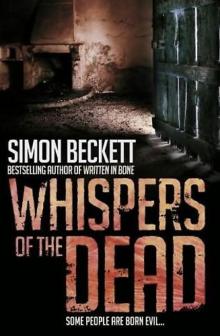 Whispers of the Dead dh-3
Whispers of the Dead dh-3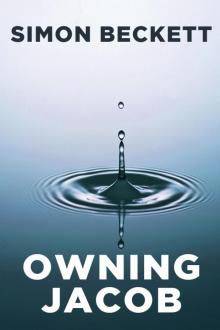 Owning Jacob (1998)
Owning Jacob (1998)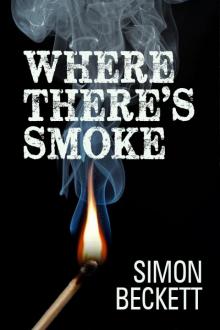 Where There's Smoke (1997)
Where There's Smoke (1997)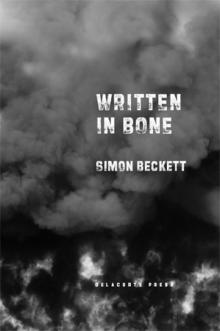 Written in Bone dh-2
Written in Bone dh-2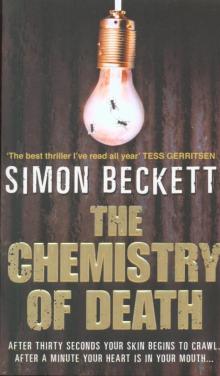 The Chemistry of Death dh-1
The Chemistry of Death dh-1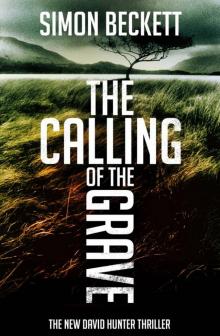 The Calling Of The Grave dh-4
The Calling Of The Grave dh-4